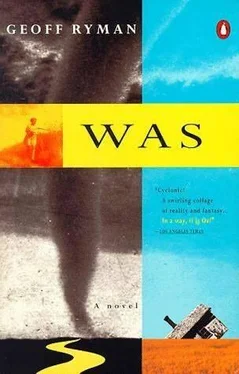"Eskimos are Indians that live right far north, all the way up in British America," said Will. "They make their houses out of snow."
Dorothy could see the Eskimo houses, sparkling in one of those bright, blue-sky days in winter. She saw an Eskimo town, their snow castles all lined up.
"Doesn't it get cold?"
"Nope. You see, you get enough snow, it shuts the cold out, just like anything else."
Another wonderful thing. Snow was warm if you got enough of it. There was a logic that made the world beneficent. It was a nice world, if you were an Indian.
"Indians are a lot nicer," said Dorothy.
"Except when they get mean and kill people," Will reminded her.
Dorothy scowled. That was the trouble with Indians. That was the thing that never made sense. Everybody liked Indians, even the adults. They bought Indian blankets. The Jewells had one up on the wall, and it was bright red and yellow in bumpy shapes. And they had an Indian buffalo hide on the floor, with the horns still on. Everybody liked Indians, but everybody was afraid of them too, and Indians tried to kill them.
"Why do they do that?" Dorothy asked in a small voice.
"Cause this used to be their country and we took it."
"But they got the Territory."
Will was silent. It didn't make sense to him either, even to him. They listened to the snow falling.
"I used to think the snow came straight from God," said Will, looking up. "Used to think it fell straight off Him in pieces. Asked my papa if His dandruff was snow."
"I used to think rain was God crying," said Dorothy.
"Then it freezes over Kansas, 'cause Kansas is so cold."
"Let's just sit here," said Dorothy. "Let's just sit here so the snow covers us up and see if it keeps us warm."
They let the snow settle over them. They sat shoulder to shoulder and watched themselves turn white. Then they heard Mr. Jewell shouting. He was far away in the fields, standing in the snow, a small dark smear, like charcoal. He was angry. Shouting for them to come back inside. What the blazes did they think they were doing?
"Your daddy swears," whispered Dorothy.
"Does a lot of other things as well," said Will, with a grunt, and stood up.
It was like the two of them were putting on masks. "We're terrible sorry, Mr. Jewell," said Dorothy. "We weren't cold. The snow would keep us warm."
"You get on into the house,", said Mr. Jewell to his son. You couldn't move around adults without doing something wrong. It was the last time Dorothy saw Will.
The funeral was held in Zeandale village. Uncle Henry, Aunty Em and Dorothy all squeezed up together on the front bench of the wagon. Now that Dorothy had been scrubbed and boiled and shorn for months, she was clean enough to sit next to Aunty Em. They huddled under lap robes and put their feet on stones that had come red-hot out of the stove. Their toes were warm, but everything else stayed cold.
Across the iron-gray fields, there were scarecrows. Aunty Em had planted them over the buffalo wallows to warn Dorothy. They were as well dressed as the rest of the family. In the icy wind, their sleeves moved, as if beckoning.
The first stop was the Jewells' farm. Bob Jewell was holding the family's mule while they got into their cart. Bob Jewell looked raw, like stripped meat, all gray and red and splotchy, with the undefended look of someone who was not used to washing. Mrs. Jewell was fat and helpless, wallowing in flesh and grief. Aunty Em took her arm as she walked toward the Jewells' wagon, and silently kissed her.
"Now you just let us all do everything, Mary," said Aunty Em. "Don't take it on yourself again. This day is for you, above anyone else." Aunty Em did not look at or talk to Bob Jewell. Aunty Em and Will's older brother, Harry, helped Mary Jewell up into the wagon. Max glared at Dorothy.
It was the cold of the Devil, hard as a sword. Their fingers, their toes, their eyes, were gnawed by the cold. Dorothy's eyes ran with water, stinging with cold. Aunty Em got back into the wagon and thought Dorothy was weeping for her friend. She patted her hand.
"We must learn to love what God takes away," murmured Aunty Em. She was recognized by everyone to be a good woman. No one would ever believe that she wasn't. Dorothy let her think what she liked, and scowled.
Dorothy was trying to feel what she was supposed to feel. She knew she was supposed to cry and carry on and need comforting. The thought of Will made her go hard and cold like stone, and that worried her. She knew she was supposed to feel more than that. The thought of mourning made her feel weary and stale. The ride there and back would be boring, and she would have to be good. She began to rock back and forth to occupy herself.
Aunty Em held her still. "Try to bear up, Dodo," she said. "We're nearly there." They were not nearly there at all.
Dorothy hated the whole business. Ahead of them for miles she could see other wagons, lined up along the road, going to the funeral, as black as beetles.
There was a picture frame behind Dorothy's knees. Each time the wagon slipped on the icy road, it knocked against her legs. It was a flower under glass, a flower made out of Dorothy's own hair. It made her feel sick.
"That will be your present to Mrs. Jewell," Aunty Em had told her. She had written a note on it. "From a young friend," it said.
Dorothy had made another present of her own. She kept it folded up inside her mitten. She would give the present to Mrs. Jewell herself, try to tell her, if she could, why Will had died. Nobody had given Dorothy a chance to tell her, even though Mrs. Jewell had said she didn't understand why. Dorothy thought she wanted to understand.
Dorothy had seen Zeandale ahead of them as soon as they had left the Jewells' farm and got onto the road. Zeandale seemed to creep toward them forever and never get any closer. The gray road, the gray sky, the gray earth, did not seem to change. It took on close to an hour.
All there was to Zeandale, the village, were a few houses and a post office store. EVERYTHING FOR SALE, said a fancy sign outside the shop. Tin tubs and pans and horse clothes were hung around the porch. The schoolhouse looked like any other building and had no steeple. Wagons were gathered all around it.
Dorothy knew Aunty Em didn't like having to come to Zeandale. She knew Aunty Em would be looked down on by the people here. She knew it from the stiff-backed way Aunty Em climbed down from the rickety wagon and from the way she folded up the hides, with a series of smart snaps, as if they were something rare and precious, to be protected. She stowed them under the seat quickly, so no one could see them.
"Now, Dorothy, the people here don't know us, so we got to show them that we're worthy of respect." The truth was that people in Zeandale did know them and only too well. The people here knew how small the house was and how poor the farm. In Manhattan, Aunty Em was still a Branscomb, the educated daughter of a local dignitary. At least, that was what Aunty Em thought. No one from Manhattan was ever invited back to see the unimproved homestead or the unimproved Henry Gulch.
Aunty Em swiped at the shoulders of Dorothy's black dress and pulled down hard on the bottom of the jacket. The dress was slightly lopsided. It had been one of Aunty Em's own.
"It was a sacrifice, cutting down this dress, but it was for your friend, Dorothy, and I was pleased to do it." Aunty Em's eyes flickered toward the Jewells, who were helping their mama toward the church. Aunty Em knelt down and smoothed the collar and shoulders and looked into Dorothy's face and breathed out wreaths of icy vapor.
"And you mustn't talk, child, not a word. We look at the good, Dorothy, and we turn our eyes from the bad. What Wilbur did was the greatest sin anybody can do. We are burying that sin today. The good men do lives on after them."
Читать дальше












